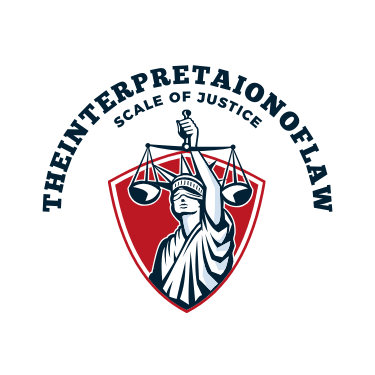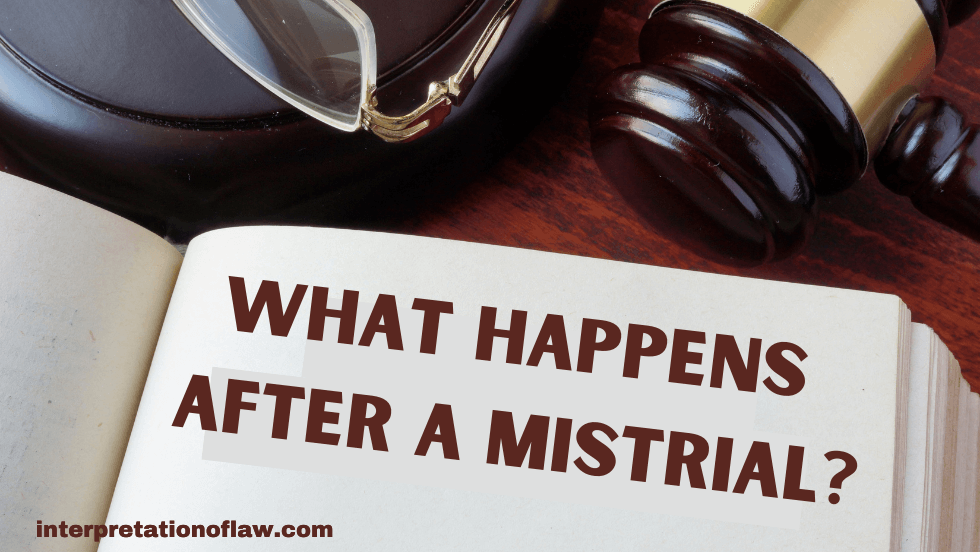Have you been following a court case and heard that the judge has declared a mistrial? A mistrial is a trial not completed due to legal technicality or an impossibility of proceeding. If you are wondering what happens if there is a mistrial, interpretationoflaw.com can provide answers.
After a mistrial has been declared, it’s essential to know if the defendant must remain in custody or will be released. As part of our research at interpretaionoflaw.com, we have gathered information regarding common questions surrounding this topic and how they can affect defendants’ rights.
With the help of our team of experts in constitutional law, criminal law, civil procedure, evidence, and many more areas, we aim to provide clarity about mistrials and how they impact defendants.
What is Mistrial?
A mistrial is a legal term that refers to the termination of a trial before its conclusion due to a fundamental error, problem, or impropriety that occurs during the trial proceedings, rendering it unreliable or unfair.
This can occur in civil and criminal cases and may necessitate a retrial or dismissal altogether.
There are various reasons that a trial might be declared a mistrial, such as:
Jury misconduct: If it is discovered that a juror has engaged in actions that compromise the integrity of the trial, such as discussing the case with outsiders, conducting independent research, or accepting bribes, a mistrial may be declared.
Improper admission of evidence: If the court determines that inadmissible evidence was erroneously allowed during the trial and that this prevented a fair determination of the case, a mistrial may be called.
Prejudicial statements or conduct: If an attorney, witness, or judge engages in conduct that unfairly and irreparably prejudices the jury against one of the parties, a mistrial may result.
Deadlocked jury: When a jury is unable to reach a unanimous verdict (in criminal cases) or a sufficient majority (in civil cases), a “hung jury” may result, leading to a mistrial.
External events affecting the trial: If unforeseen events, such as natural disasters or public emergencies, prevent the continuation of the trial, a mistrial may be declared.
What happens after a mistrial?
After a mistrial has been declared, the next steps depend on the reason for the mistrial and whether or not it was requested by one of the parties.
If the mistrial was due to a fundamental error or misconduct by the prosecution or defense, the case may be dismissed altogether. In this scenario, if the defendant is in custody, they will typically be released.
However, if the mistrial was declared due to a deadlocked jury or external events beyond the control of either party, a retrial will usually occur. The defendant may remain in custody until the new trial begins unless they can post bail or are released on their recognizance.
It’s important to note that double jeopardy does not apply in the case of a mistrial, as the trial was not completed, and thus there is no verdict or conviction. This means the prosecution can bring the exact charges against the defendant in a retrial.
Do you get released after a mistrial?
When a mistrial occurs, many people are left wondering what happens next. The simple answer is that it depends on the circumstances. A mistrial occurs when a jury cannot reach a verdict, or something happens during the trial that makes a fair trial impossible. If a mistrial is declared, the judge can dismiss the case or start the practice again with a new jury.
If the case is dismissed, the defendant will be released and will not face any further charges. However, if the judge decides to start the trial again, the defendant will remain in custody until the trial is completed. Regardless of the outcome, mistrials can be a frustrating and uncertain time for everyone involved.
How common is a hung jury?
National Center for State Courts data shows that hung juries occur in approximately 6-10% of criminal trials. The rate is slightly lower in civil trials at 1-2%. This means that mistrials due to deadlocked juries are common and can happen even with both sides’ careful jury selection and preparation.
However, it’s important to note that a mistrial does not necessarily mean that the jury was evenly divided, as a single holdout juror can lead to a deadlocked jury.
Who benefits most from a hung jury?
Usually, the party that benefits most from a hung jury is the defendant. This is because the prosecution still needs to secure a conviction and must decide whether to retry the case. In some instances, prosecutors may drop the charges altogether if they do not feel confident in securing a belief in a new trial.
However, this does not necessarily mean that the defendant will be released or have their charges dropped, as the prosecution may choose to pursue a retrial.
Ultimately, it’s difficult to determine who benefits explicitly from a hung jury, as it depends on the unique circumstances of each case.
The decision to declare a mistrial
The decision to declare a mistrial is typically made by the presiding judge, who can make the call when they believe there is no possibility of a fair and impartial trial proceeding.
If a mistrial is declared, the case may need to be retried from the beginning with a new jury. Alternatively, the prosecution may refrain from reinitiating the process if they lack the necessary evidence, legal foundation, or resources for a successful retrial.
Consequences of a mistrial
The consequences of a mistrial can vary depending on the circumstances. While a mistrial may lead to the potential case dismissal, as previously mentioned, in other instances, it can result in the parties reaching a settlement or the case being retried with hopes of securing a different outcome.
Examples of mistrial cases include:
The 2011 trial of Dr. Conrad Murray for the death of Michael Jackson, the defense requested a mistrial due to a prosecution witness testimony, but the judge denied the request.
The 2017 trial of Bill Cosby for sexual assault allegations, where the jury could not reach a unanimous decision, resulted in a mistrial being declared. Cosby was later convicted in a 2018 retrial.
To avoid mistrials, selecting carefully and instructing jurors, following proper legal procedures, and ensuring that all participants refrain from prejudicial actions or statements are essential.
Public opinion on mistrials may be divided, as some view them as an example of the legal system working as it should – safeguarding the rights and interests of the parties involved and ensuring a fair trial. However, others may perceive mistrials as a failure of the legal process and a waste of taxpayers’ money.
In conclusion, mistrials are an integral component of the legal system, providing a mechanism to safeguard the fairness and integrity of the trial process. By understanding the various reasons that can lead to a
FAQs
What is the longest hung jury?
No official statistics are available on jury deliberations. However, in 2003, a jury in Oakland, California, deliberated for 55 days before acquitting three police officers who had been accused of assaulting and falsely arresting residents.
What is the God roll hung jury?
The most optimal roll for this item is the combination of Rapid Hit and Kinetic Tremor. As a new perk, Kinetic Tremor generates three shockwaves around enemies that receive continuous Kinetic damage.
Is hung jury still good?
While the “Hung Jury” scout rifle was a popular choice in Destiny 2, it has since been replaced by newer weapons with more vital stats and perks. However, for players who enjoy using the “Hung Jury”, it can still be considered a solid weapon choice.
Is a defendant released after a mistrial Florida?
This implies that the defendant is neither acquitted of the crime nor convicted yet and will likely be detained (unless they have posted bail) until the commencement of the new trial. Mistrials are infrequent occurrences, but they do happen.
Summary
A mistrial may result in various outcomes, including case dismissal or retrial. It is not uncommon for a mistrial to occur, and the decision to declare one rests with the judge. Mistrials can have different consequences depending on the case, and avoiding them requires careful procedures and adherence to legal standards. Public opinion on mistrials may vary.
Is a defendant released after a mistrial? Yes, a defendant can be released after a mistrial, depending on the case’s specific circumstances. However, this is only sometimes guaranteed and can result in different outcomes, such as retrial or settlement. Mistrials are essential to the legal system and are crucial in ensuring fair trials.
While they may create uncertainty for all parties involved, mistrials protect the integrity and fairness of the justice system.
So, a defendant may or may not be released after a mistrial, but it ultimately depends on the unique circumstances of each case.
Therefore, it is essential for all participants to carefully navigate the legal process and avoid actions that could potentially lead to a mistrial.

Carter Wilson is a licensed lawyer with over 10 years of experience in various legal fields. He is passionate about making law accessible to the general public and helping individuals navigate through complex legal matters.

